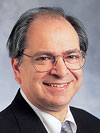Hadassah
Editor's Wrapup
Editor’s Wrapup: What’s New?
 Despite rapid advances in technology and medicine, human affairs seem to change slowly, if at all. Our language is littered with expressions—history repeats itself; the more things change, the more they remain the same—that highlight the natural tendency toward reruns.
Despite rapid advances in technology and medicine, human affairs seem to change slowly, if at all. Our language is littered with expressions—history repeats itself; the more things change, the more they remain the same—that highlight the natural tendency toward reruns.
But repeat performances also offer second chances. Just over 10 years ago, Benjamin Netanyahu was Israel’s prime minister, balancing the country’s desire for peace with its need for security. Today, he is back in the same office and faces a landscape that, minus an Arafat and plus an Ahmadinejad, looks similar to what he confronted last time. The prime minister recently spoke about the challenges of peace and defense with Hadassah Magazine’s Charley J. Levine; excerpts from their conversation appear on page 64.
When reruns are cast as revival, they can be inspiring. After the Holocaust and Communism, few expected vibrant Jewish life to return to Budapest. But, as Ruth Ellen Gruber writes, the Hungarian capital today has not only an organized Jewish community but also a lively Jewish youth scene. Her report begins on page 50.
Things that seem unchanged for centuries can be deceiving. As Gershom Gorenberg reports, ultra-Orthodox Jewish communities in which men spend a lifetime in study and their wives have a dozen children, are a product not of long tradition but of modern Israel. In “Learning Curve” (page 12), he observes that declining state subsidies for this lifestyle may result in more work and smaller families.
It’s hard to know if history is repeating itself when it comes to us through the fog of time. Most retellings of the Hanukka story, for example, focus almost exclusively on the Maccabee men, but it turns out that history has a glass wall to block any mention of the contributions of women. In “Hanukka With Two Genders” (page 16), Leora Eren Frucht talks to some scholars and educators who are trying to lift the fog and break the glass. —Alan M. Tigay










 Facebook
Facebook Instagram
Instagram Twitter
Twitter
Leave a Reply